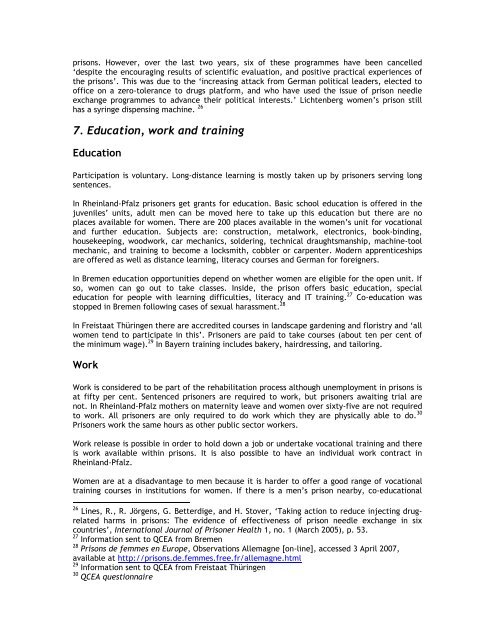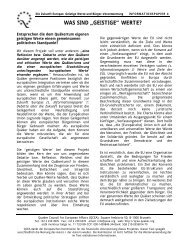Country Report: Germany
Country Report: Germany
Country Report: Germany
You also want an ePaper? Increase the reach of your titles
YUMPU automatically turns print PDFs into web optimized ePapers that Google loves.
prisons. However, over the last two years, six of these programmes have been cancelled<br />
‘despite the encouraging results of scientific evaluation, and positive practical experiences of<br />
the prisons’. This was due to the ‘increasing attack from German political leaders, elected to<br />
office on a zero-tolerance to drugs platform, and who have used the issue of prison needle<br />
exchange programmes to advance their political interests.’ Lichtenberg women’s prison still<br />
has a syringe dispensing machine. 26<br />
7. Education, work and training<br />
Education<br />
Participation is voluntary. Long-distance learning is mostly taken up by prisoners serving long<br />
sentences.<br />
In Rheinland-Pfalz prisoners get grants for education. Basic school education is offered in the<br />
juveniles’ units, adult men can be moved here to take up this education but there are no<br />
places available for women. There are 200 places available in the women’s unit for vocational<br />
and further education. Subjects are: construction, metalwork, electronics, book-binding,<br />
housekeeping, woodwork, car mechanics, soldering, technical draughtsmanship, machine-tool<br />
mechanic, and training to become a locksmith, cobbler or carpenter. Modern apprenticeships<br />
are offered as well as distance learning, literacy courses and German for foreigners.<br />
In Bremen education opportunities depend on whether women are eligible for the open unit. If<br />
so, women can go out to take classes. Inside, the prison offers basic education, special<br />
education for people with learning difficulties, literacy and IT training. 27 Co-education was<br />
stopped in Bremen following cases of sexual harassment. 28<br />
In Freistaat Thüringen there are accredited courses in landscape gardening and floristry and ‘all<br />
women tend to participate in this’. Prisoners are paid to take courses (about ten per cent of<br />
the minimum wage). 29 In Bayern training includes bakery, hairdressing, and tailoring.<br />
Work<br />
Work is considered to be part of the rehabilitation process although unemployment in prisons is<br />
at fifty per cent. Sentenced prisoners are required to work, but prisoners awaiting trial are<br />
not. In Rheinland-Pfalz mothers on maternity leave and women over sixty-five are not required<br />
to work. All prisoners are only required to do work which they are physically able to do. 30<br />
Prisoners work the same hours as other public sector workers.<br />
Work release is possible in order to hold down a job or undertake vocational training and there<br />
is work available within prisons. It is also possible to have an individual work contract in<br />
Rheinland-Pfalz.<br />
Women are at a disadvantage to men because it is harder to offer a good range of vocational<br />
training courses in institutions for women. If there is a men’s prison nearby, co-educational<br />
26 Lines, R., R. Jörgens, G. Betterdige, and H. Stover, ‘Taking action to reduce injecting drugrelated<br />
harms in prisons: The evidence of effectiveness of prison needle exchange in six<br />
countries’, International Journal of Prisoner Health 1, no. 1 (March 2005), p. 53.<br />
27 Information sent to QCEA from Bremen<br />
28 Prisons de femmes en Europe, Observations Allemagne [on-line], accessed 3 April 2007,<br />
available at http://prisons.de.femmes.free.fr/allemagne.html<br />
29 Information sent to QCEA from Freistaat Thüringen<br />
30 QCEA questionnaire



